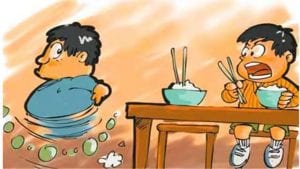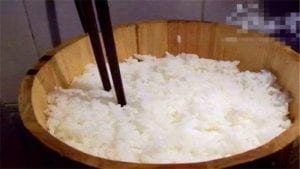Title: Chopsticks Upright in Food
General Information about Item:
- Bad Luck Superstition
- Language: Chinese
- Country of Origin: China
- Informant: Siyao Wang
- Date Collected: 10-28-2018
Informant Data:
- Siyao Wang is a 25 year old man from Beijing, China. He has lived his entire life in Beijing and attended university there. He graduated from medical school last year and is now a sports medicine doctor.
Contextual Data:
- Cultural Context: Taoism has played an important role in Chinese culture. It is an ancient ideology that has influenced all areas of life in China, and has even effected the bad luck superstitions that many Chinese people hold today. One important aspect of Taoism is its concern with the dead and ghosts. When a person dies in China, often a bowl of rice with chopsticks upright is placed on the grave. This is in case the dead person gets hungry.
- Social Context: Siyao learnt this superstition at school as Taoist principles are often taught at a young age. This is a superstition that Chinese people are very careful to uphold. Siyao explained to me that this is “traditional Chinese culture” that is considered highly important throughout the country.
Item:
- It is considered bad luck if one places chopsticks upright in their bowl of food.
Associated file (a video, audio, or image file):
Informant’s Comments:
- Siyao explained that Chinese people are very concerned with the dead and ghosts. Chinese people are very careful so as not to offend the dead and reap the consequences. That is why people leave food at the grave of a dead person, as they are trying to stay in their good graces so that they are not haunted for years to come. Siyao emphasized to me the extent to which Chinese people are worried about appeasing the dead and not insulting them. If chopsticks are placed in the food upright this may awaken the dead and the food immediately becomes “for the dead people”.
Collector’s Comments:
- This superstition greatly emphasized the importance of appeasing the dead in Chinese culture and thus reveals how much Taoism has influenced modern day China. Reminders of the dead are often considered bad luck in Chinese and thus many superstitions have arisen about objects/actions associated with death.
Collector’s Name: Sebastian Carter
Tags/Keywords:
- Customary Lore
- Bad Luck Superstition
- Chopsticks upright in food



